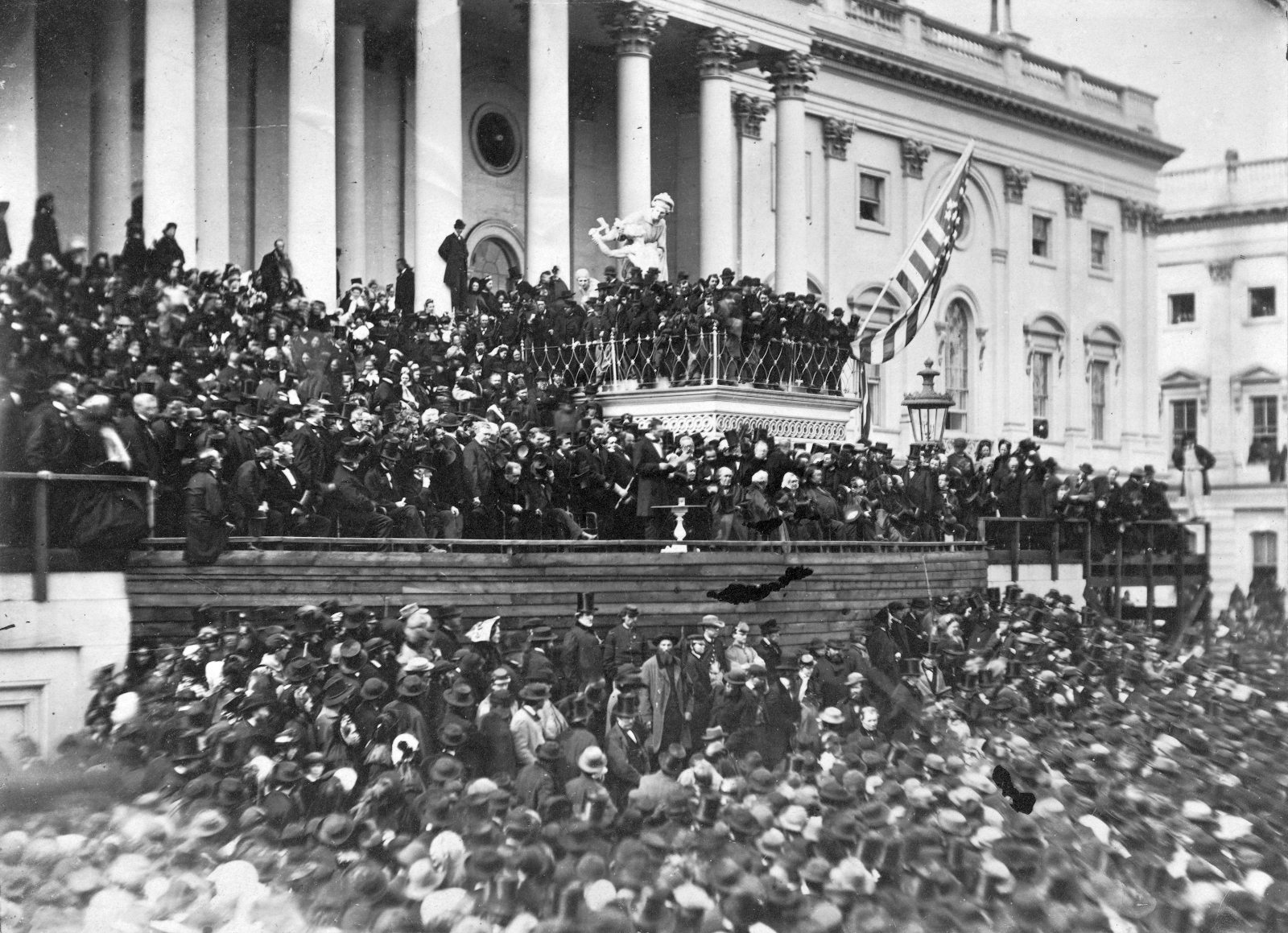There aren't a lot of photographs of Abraham Lincoln delivering speeches. In fact, there's only one. On March 4, 1865, he delivered his second inaugural speech from the picture seen above. I know it's a little hard to see specifics, but maybe this close up will help:
You can read the full speech here. It's a good one. So good they inscribed it on the Lincoln Memorial with the Gettysburg Address. I can't imagine any modern president giving a speech like this.
He had 41 days to live.
On March 11 he issues Proclamation 124, pardoning any and all deserters of the Union Army provided they return to their posts within a certain time. The war seemingly is running its toll on the nation. Keep in mind that Virginia, a Confederate state, is not that far from Washington, DC.
On March 14 he issues an executive order on the subject of retaliation. For every Union soldier killed, a Confederate soldier must also be killed. For every Union soldier taken into slavery, a Confederate soldier must be captured and put to hard labor until his corresponding soldier is set free. This is possibly the president who wanted peace more than any other president in history. To resort to this must have been like acid in his bloodstream. A necessary evil? If only he knew what would happen in less than a month.
On March 17 he addresses the Indiana regiment, pumping them up for winning the war. He mentions that Confederates are pressing 1 out of 4 slaves into fighting the war for them. Looking back on the speech with modern eyes is a definite collar-puller, though. You can read it here. Lincoln may have been the best of the presidents, but he was far from perfect.
On March 27 he issues an executive order to raise the American flag at Ft. Sumter, won back by William "War is Hell" Sherman. If you don't know, that's where the Civil War officially began when Confederates raided the fort. The very same commander who lost the fort was the man to raise the flag over it again. It was a symbolic gesture to show that the war was finally going well for the North.
On April 3 the Union sounds the death knell for the South by taking Richmond, just a hop skip and jump from the White House. The very next day Lincoln visits Richmond without fear for his life.
On April 9 it happens. Robert E. Lee surrenders the Confederacy to Ulysses S. Grant, thus ending the Civil War.
On April 11 Lincoln makes his final speech on the White House lawn. It's his victory lap, but it's also about what the country needs to do next: Reconstruction. He talks about not just throwing the Confederates in the trash because that's where they belong. He talks about reform. Healing. Helping them become better people. As one can imagine, that doesn't sit well with many people. One person in particular. You can read this speech here. It's also a good one. A little awkward, again by modern judgment, but still good.
On April 14, 41 days after his second inaugural address, Abraham Lincoln goes to Ford's Theater for a play called Our American Cousin. He sits in the balcony overlooking the stage. He doesn't sense a shadowy figure behind him. He may not even hear the sound of a pistol going off. The bullet soars out of the gun and plants itself in the back of Lincoln's head.
Stop.
Let's take that bullet out of Lincoln's skull and put it back in John Wilkes Booth's gun. Let's walk him back out of the balcony. Back to the saloon where he spent the intermission. Back to earlier in the day when he told his co-conspirators that Lincoln was going to be at the theater that night. He sent someone to kill Secretary of State Sewell and one to kill Vice President Johnson. Go back earlier in the day to when Booth showed up at Ford's Theater to pick up his mail, to when he was told that Lincoln would be attending the play that night.
Back to April 12 when he learns of Lee's surrender at Appomattox. He tells others that he's planning to retire from the stage to focus only on Venice Preserv'd, a play about assassination. Because now he knows that Lincoln must die. This is when he makes the decision.
Back to April 11 as he watches Lincoln from the White House lawn giving a speech about winning the Civil War and the Reconstruction that must follow. As Booth learns that Lincoln intends to give slaves rights, he vows that this will be Lincoln's final speech.
It is.
Back to March 17 when Booth learns that Lincoln will attend a play called Still Waters Run Deep at Soldier's Home. Booth immediately plots to kidnap Lincoln and even puts his men on the road to Soldier's Home. Lincoln never shows. As we know from above, he was too busy on that day for theater.
Back to March 5 when he boasts to friends about how close he was to Lincoln the previous day. "What an excellent chance I had to kill the president," he tells them.
Because go back to that first picture. It's hard to see, but Booth wasn't lying about being close to Lincoln that day:
Look a little closer.
Time is a flat circle.




No comments:
Post a Comment